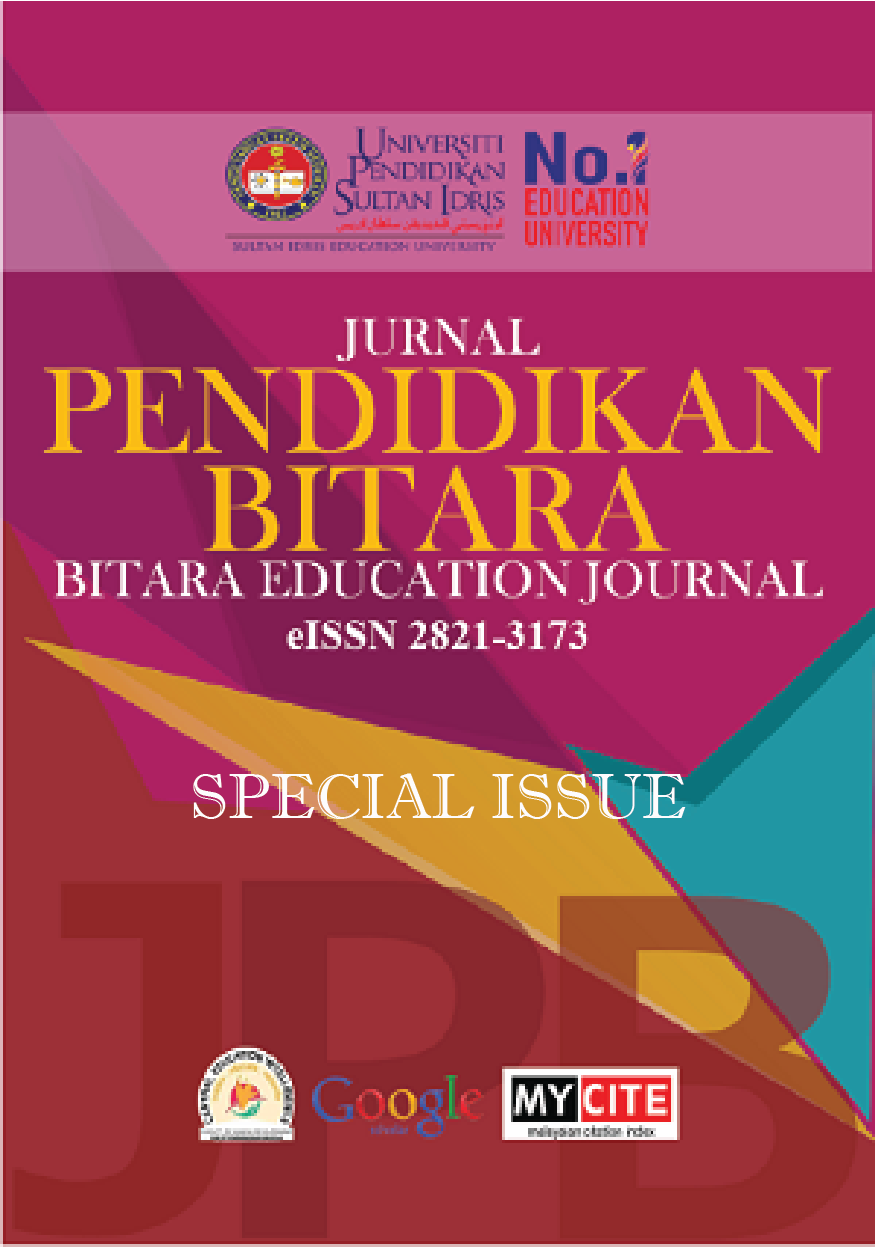Maker-centred in Classroom Learning: Metamorphosis of Primary Education in Malaysia
DOI:
https://doi.org/10.37134/bitara.vol14.sp.13.2021Keywords:
Maker Education, Maker-centred learning, Primary Schools, STEM EducationAbstract
The paradigm shift from consumer to producer mindset to cultivate transversal competencies other than building a strong foundation in primary education is a major challenge for global educators and researchers. Therefore, as initial efforts, Malaysia has developed and strengthened the reasoning skill as one of the basic skills in primary education. The move to abolish examination by introducing classroom-based assessments has redirected the learning and teaching in the classrooms. Recently, project-based learning, problem-based learning and inquiry-based learning are being studied and applied. However, the rapid growth of hands-on activities has questioned the effectiveness of these learning approaches. Additionally, direct instructions to promote the 21st-century skills and inadequate use of technology, materials and science laboratories in primary schools are still unsolved issues. The smart entrepreneurs have transformed this loophole into a commercial value by creating makerspace or online makers learning for the elite community in Malaysia. This paper attempts to discuss the maker movement in Malaysia with a comparative study on Maker Education to initiate the ideas in Malaysian schools. Theories behind this playful exploration of ideas and materials will be addressed in this study to increase the relevant articles and resources on Maker-centred learning (MCL) in Malaysia. Furthermore, the idea of bridging the Maker concept with STEM education will be explored to turn it into a golden opportunity for researchers and educators to instil future skills with maker-centred learning in the classroom.
Downloads
References
Alley, W. (2018). Making English speakers: Makerspaces as constructivist language environments. Mextesol Journal, 42(4), 1–8.
Baharin, N., Kamarudin, N., & Manaf, U. K. A. (2018). Integrating STEM Education Approach in Enhancing Higher Order Thinking Skills. International Journal of Academic Research in Business and Social Sciences, 8(7), 810–821. https://doi.org/10.6007/ijarbss/v8-i7/4421
Bevan, B. (2017). The promise and the promises of Making in science education. Studies in Science Education, 53(1), 75–103. https://doi.org/10.1080/03057267.2016.1275380
Bevan, B., Gutwill, J. P., Petrich, M., & Wilkinson, K. (2015). Learning Through STEM-Rich Tinkering: Findings From a Jointly Negotiated Research Project Taken Up in Practice. Science Education, 99(1), 98–120. https://doi.org/10.1002/sce.21151
Blackley, S., Rahmawati, Y., Fitriani, E., Sheffield, R., & Koul, R. (2018). Using a makerspace approach to engage Indonesian primary students with STEM. Issues in Educational Research, 28(1), 18–42.
Care, E., Vista, A., & Kim, H. (2019). Assessment of Transversal Competencies Current Tools in the Asian Region. In Unesco. Retrieved from https://www.researchgate.net/publication/333700936_Assessment_of_transversal_competencies_current_tools_in_the_Asian_region/citation/download
CDC, (2012).Curriculum Development Centre, Ministry of Education Malaysia.
Chasanah, L., Kaniawati, I., & Hernani, H. (2017). How to Assess Creative Thinking Skill in Making Products of Liquid Pressure? Journal of Physics: Conference Series, 895(1). https://doi.org/10.1088/1742-6596/895/1/012164
Chen, Y., Wu, C. (2017) The hot spot transformation in the research evolution of maker. Scientometrics 113, 1307–1324. https://doi.org/10.1007/s11192-017-2542-4
Garcia, P. C., & Fernandez, T. G. (2019). Influence of maker-centred classroom on the students’ motivation towards science learning. Cypriot Journal of Educational Sciences, 14(4), 535–544. https://doi.org/10.18844/cjes.v11i4.4098
Godhe, A. L., Lilja, P., & Selwyn, N. (2019). Making sense of making: critical issues in the integration of maker education into schools. Technology, Pedagogy and Education, 28(3), 317–328. https://doi.org/10.1080/1475939X.2019.1610040
Hasnida, N., & Ghazali, C. (2017). The implementation of the School-Based Assessment System in Malaysia: A study of teacher perceptions. The Implementation of School-Based Assessment System in Malaysia: A Study of Teacher Perceptions, 12(9), 104–117.
Hira, A., & Hynes, M. M. (2018). People, Means, and Activities: A Conceptual Framework for Realizing the Educational Potential of Makerspaces. Education Research International, 2018. https://doi.org/10.1155/2018/6923617
Holm, E. J. Van. (2015). Makerspaces and Contributions to Entrepreneurship. Procedia - Social and Behavioral Sciences, 195, 24–31. https://doi.org/10.1016/j.sbspro.2015.06.167
Jaatinen, J., & Lindfors, E. (2019). Makerspaces for Pedagogical Innovation Processes: How Finnish Comprehensive Schools Create Space for Makers. Design and Technology Education, 24(2), 42–67.
Jiun, L. T., Kamarudin, N., Khairul, M., & Ahmad, A. (2019). Introduction of STEM Teaching Approaches. 3(1), 8–11.
Lam, K. F. T., Wang, T. H., Vun, Y. S., & Ku, N. (2019). Developing critical thinking in a STEAM classroom. CEUR Workshop Proceedings, 2555, 82–90.
Lilia, H. (2017). Improving Science Literacy Through a Conductive Laboratory Learning Environment: A Proposed Model. Plenary Paper Presented at Third International Conference on Science and Mathematics Education (CoSMEd), 10th-12th November.
Martin, L. (2015). The promise of the maker movement for education. Journal of Pre-College Engineering Education Research, 5(1), 30–39. https://doi.org/10.7771/2157-9288.1099
OCR. (2011). www.ocr.org.uk Level 2 Award Thinking and Reasoning Skills. (January). Retrieved from www.ocr.org.uk500/5687/6%0Ahttp://www.ocr.org.uk/Images/80819-specification.pdf
Robertson, L. (2020). Tackling Integrated STEM in Elementary Education : A Collaborative Approach Tackling Integrated STEM in Elementary Education : A Collaborative Approach. (April).
Schlegel, R. J., Chu, S. L., Chen, K., Deuermeyer, E., Christy, A. G., & Quek, F. (2019). Making in the classroom: Longitudinal evidence of increases in self-efficacy and STEM possible selves over time. Computers and Education, 142. https://doi.org/10.1016/j.compedu.2019.103637
Singh, P., Supramaniam, K., & Sian Hoon, T. (2017). Re-assess or risk the slow death of school-based assessment. Pertanika Journal of Social Sciences and Humanities, 25(February), 71–80.
Tangney, B., Jake Byrne, & Girvan, C. (2020). Constructionism 2020.
Taylor, B. (2016). Evaluating the benefit of the maker movement in K–12 STEM education. Electronic International Journal of Education, Arts, and Science, 2,1–22
Tian, Q., Zhang, J., Tang, C., Wang, L., Fang, J., & Zhang, Z. (2020). Research topics and future trends on maker education in China based on bibliometric analysis. International Journal of Information and Education Technology, 10(2), 135–139. https://doi.org/10.18178/ijiet.2020.10.2.1352
Wang, T. H., Lim, K. Y. T., Lavonen, J., & Clark-Wilson, A. (2019). Maker-Centred Science and Mathematics Education: Lenses, Scales and Contexts. International Journal of Science and Mathematics Education, 17, 1–11. https://doi.org/10.1007/s10763-019-09999-8
Zhu, L. (2020). Perceptions and Applications of Maker-Centered Pedagogies in K – Grade 12 ADST and STEM Education in BC Public Schools (Unpublished M.A Thesis). 143.





